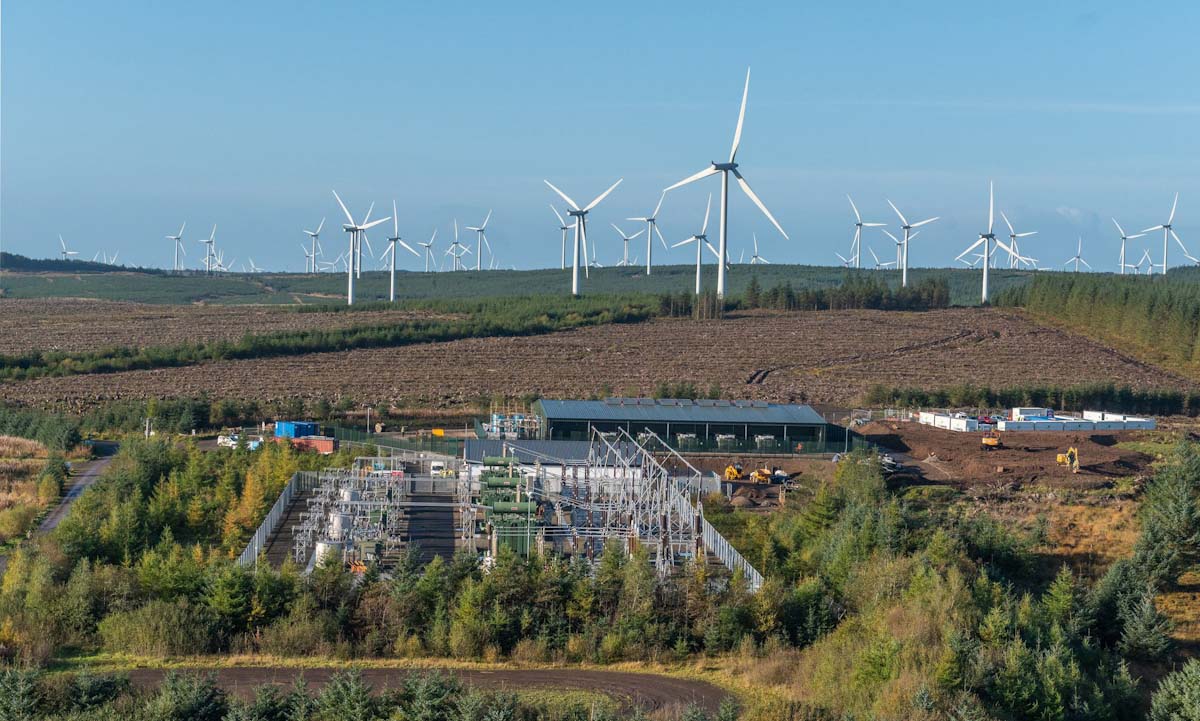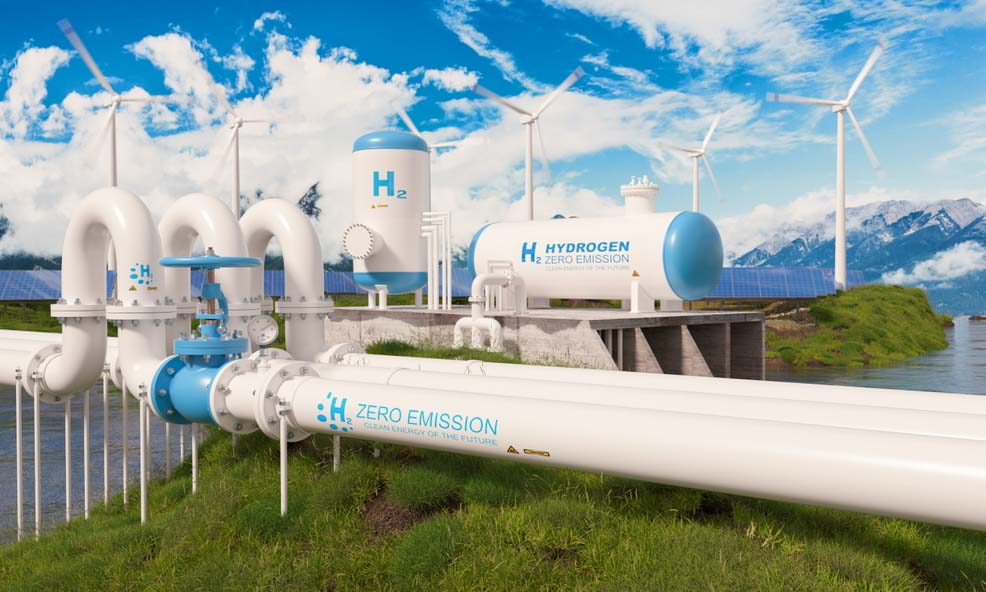
One of the biggest challenges with the energy transition is the storage capacity required for the exponential growth in renewables, and crucial solutions are being developed in Scotland.
Energy storage capacity is urgently needed to meet net-zero targets. The UK alone needs another 29GW of grid-support energy storage by 2035.
With grid capacity coming under increasing strain and a lack of connections delaying the construction of renewables projects, there is a drive in Scotland to develop long duration energy storage (LDES) capabilities.
The purpose of LDES is to have the capacity to store and release energy for eight hours or longer to achieve a balance in generation from intermittent sources such as wind and solar, as well as the more predictable tidal. Building sufficient LDES capacity can also avoid the need for expensive and potentially disruptive grid updates.
With multi-gigawatts of renewable energy projects in the pipeline, Scotland is developing a range of capabilities from grid-scale, commercial, industrial, and residential solutions, along with thermal and seasonal storage in heat networks.
“Energy storage is so important, it’s critical for the energy transition in terms of grid stability and reliability, as well as renewable energy integration when you see the increasing amount of renewable energy that we’re bringing onto the grid,” says Doreen Reid, energy transition specialist at Scottish Enterprise.
The battery electric storage solutions in Scotland
Battery storage is a leading solution for the energy transition, with businesses in Scotland making vital contributions. Aberdeen-headquartered Norco Group provides scalable battery energy storage systems (BESS) required to store curtailed energy generated by renewables. The company has more than 30 years’ experience in delivering critical power systems, energy storage capabilities, and related services.
Building on a history of supplying and maintaining forklift truck batteries and backup power systems, the company is applying this expertise to energy storage systems, with dedicated teams to both batteries and renewables.
Battery systems available from Norco range from the common lithium-ion solution to nickel-cadmium models, and valve-regulated lead-acid (VRLA) units in both gel and absorbent glass mat (AGM) types.
With upfront cost being one of the biggest barriers to energy storage, Norco has developed a solution.
“We offer a battery rental model – an approach that was innovative when we first introduced it and remains a valuable option for customers today. This allows us to support clients who may find the initial investment prohibitive, making energy storage more accessible and financially viable,” explains John Roy, director of Norco Group Limited
Given Scotland’s abundance of renewable energy – such as wind, hydro, and tidal – businesses with BESS capabilities such as Norco have access to multiple market opportunities.
“With a Scottish Government commitment to achieve 50% of total energy demand by renewables by 2030, we are ideally placed to capture the surplus energy using energy storage, for deployment when demand exceeds generation capabilities,” adds Roy.
Scottish providers of flow battery systems
Vanadium flow batteries are another type of solution attracting increasing attention, as lithium supplies come under pressure. Vanadium batteries have an estimated 30-year service life, are at low risk of overheating, and materials can be fully recycled once their operations end. Unlike lithium-ion models, vanadium flow batteries require a fixed position and are not an option for electric vehicles. Therefore, energy storage is their optimal application.
Mhor Energy is a Scottish company providing flow batteries that cover residential, commercial, industrial, and grid scales.
“Our flow batteries directly address key energy storage challenges by being inherently safe and non-flammable. This makes them far easier to deploy in both remote locations, where support infrastructure is limited, and in populated areas, where safety is critical,” says Dr Declan Bryans, chief technology officer of Mhor Energy. “In addition, our system’s heat tolerance removes cooling requirements, allowing more of the energy stored to be returned to the consumer.”
Alongside flow batteries, the company provides heat storage capabilities. This opportunity was created after discussions with Star Renewables, an internationally recognised provider of industrial heat pumps in Scotland. Mhor Energy offers systems for heat extraction storage that can be integrated with geothermal energy, waste heat recovery, and water pumps to support utility companies in the colder months.
In residential settings, the company’s home systems convert heat from domestic water-filled heating systems into energy that is stored in rechargeable batteries.
Innovators in energy storage technologies
Companies in Scotland are developing niche solutions in specific areas with market opportunities. Another company in Scotland involved with batteries is Dukosi, which is targeting a specific niche component for BESS manufacturers through its on-cell battery monitoring system.
Beyond batteries, Scotland has a diverse range of energy storage innovations that are making notable progress. Highview Power is planning to build liquid air energy storage facility in Hunterson on the west coast of Scotland. While Edinburgh-based Flexitricity is a specialist provider of energy asset optimising solutions.
Then there are companies such as TownRock Energy, which is making headlines around the world with its thermal energy storage solutions, notably reusing waste heat from a Glasgow nightclub to power the venue. The company is also involved in the Galleries 2 Calories project that seeks to harness Scotland’s extensive underground mine network for thermal energy storage.
Promising projects in energy storage in Scotland
Universities in Scotland play a pivotal role in furthering innovations in energy storage technologies both nationally and overseas.
Based at the University of Strathclyde, the Power Networks Demonstration Centre (PNDC) is an internationally recognised innovation and testing facility. Here, Edinburgh-based StorTera has been collaborating on a project with TATA Power to address issues in India, where energy outages and disruption to the electrical network are caused by transformer maintenance. The specially designed solution is a 100kW BESS that can be moved on a trailer to areas where it is needed most.
StorTera has been conducting testing at PNDC ahead of field trials in India, where the BESS will be connected to a transformer from TATA Power to assess how the system performs in the operational environment. The BESS from StorTera is intended to offer greater grid stability and a more reliable electricity supply.
In addition, St Andrews University is home to the Colin Vincent Centre for Battery Technology. The centre is dedicated to driving innovations in energy storage, with specialist facilities for developing and testing the components and materials – even those with sensitive chemistries. While the core focus of the centre is on lithium-ion batteries, active research is underway on sodium-ion batteries to support more sustainable energy storage solutions in the long term.
With hydrogen also a part of the conversation around energy storage, the University of St Andrews includes specialist facilities focused on areas such as fuel cells, electrolysers, and green ammonia. The School of Chemistry and the Genesis Centre are key to furthering research in these areas. The university is also actively involved with The Hydrogen Accelerator to expand Scottish capabilities in green and low-carbon hydrogen.
Support available for energy storage innovations in Scotland
Scotland’s combination of industrial heritage and world-class universities offers a talent pool that includes those with extensive industrial experience and those starting out in their careers with a desire to learn.
Alongside talent is the support available for innovation that is critical in the early stages of projects before entering commercial markets. Organisations such as Scottish Enterprise can provide mentoring services and advice for new businesses and established companies seeking to diversify their services.
“At Scottish Enterprise, one of our key roles is to bring companies together to form clusters. This increases collaboration and innovation through enabling businesses to share ideas, resources, and expertise,” adds Reid.
Scottish Enterprise can also keep innovators updated on the latest funding rounds. One example is the CAN DO Innovation Green Heat Feasibility Call, which awarded £750,000 to 16 projects to support the development of the clean heat supply chain. Mhor Energy was one of the successful recipients of a 100% funded grant.
“Being based in Scotland gives us access to a strong renewable energy sector, a skilled workforce, and a supportive innovation ecosystem. Scotland’s ambitious net zero targets and government backing for clean technologies create an environment that encourages collaboration and growth,” adds Bryans. “In addition, proximity to world-class universities and research centres provides us with talent and technical expertise, while strong international links position us well to serve both local and global markets.
To learn more about the energy storage market in Scotland, download the document below.




